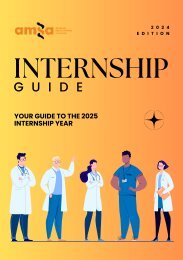Vector Volume 11 Issue 1 - 2017
Create successful ePaper yourself
Turn your PDF publications into a flip-book with our unique Google optimized e-Paper software.
the tensions which exist between service learning and the<br />
respect of patient rights and well-being.[17]<br />
Social justice-oriented approaches to service learning,<br />
coupled with active critical reflection, also serve viable<br />
pedagogical approaches for learning the health advocate<br />
role.[10] This means that students should be able to better<br />
recognise and address relevant ethical and professional<br />
issues, with a greater understanding and appreciation<br />
of altruism, social justice, autonomy, and integrity as a<br />
result.[10] When a student does undertake an elective in a<br />
developing country, such experience leads to higher levels<br />
of community health knowledge on return, a greater sense<br />
of what it means to be vulnerable, a heightened awareness<br />
of the social determinants of health, and an appreciation<br />
of the importance of socially responsible approaches for<br />
community engagement and health advocacy.[10]<br />
Another important consideration is to enable bi-directional<br />
flow of medical students through formal partnerships between<br />
university institutions. This can facilitate more positive<br />
elective experiences through sustainable relationships and<br />
effective involvement in medical care, as well as encouraging<br />
an international medical workforce in the future.[5] Along<br />
with fostering such connections, skills building in crosscultural<br />
effectiveness, long-term sustainability planning, and<br />
local capacity building may help to produce more effective<br />
overseas opportunities with meaningful outcomes.[7]<br />
Discussion<br />
Overall, there is a clear need for individuals who wish to<br />
undertake medical electives in the future to reflect upon<br />
ethical and best practice guidelines prior to departure,[2] and<br />
to subsequently decide whether the experience is right for<br />
them.[12] It would also be of benefit to engage in conversation<br />
with previous cohorts about their elective experiences,<br />
enabling a baseline understanding of any challenges that lie<br />
ahead. Pre-departure, students should aim to gain as much<br />
contextual knowledge as possible in relation to their host<br />
country, including the language, the specific local needs,<br />
the details of the participating institution and the work being<br />
carried out. Students must recognise the possible ethical<br />
consequences of the work being done, and appreciate the<br />
potential impact they might have during such an experience.<br />
[12, 16]<br />
By incorporating a greater emphasis on learning and on<br />
reflection prior to, during, and after an international medical<br />
elective experience, students will be better placed to question<br />
their values, assumptions, and beliefs to help mitigate<br />
the potential harms which their placement may cause.<br />
[15] Students must actively question themselves and their<br />
surroundings, consider the ways in which healthcare is being<br />
delivered, and engage with potential ethical dilemmas and<br />
broader social, political and economic concerns underlying<br />
their medical provision, without necessarily being engaged<br />
in the direct provision of medical care.[<strong>11</strong>] Indeed, practising<br />
beyond one’s capabilities as a medical student is central<br />
to the potential harm which may result during an overseas<br />
elective in a resource-poor environment, particularly when<br />
this is coupled with a lack of adequate supervision.<br />
Education and planning are essential in minimising harm<br />
to host communities. It is necessary to have well-defined<br />
objectives and structured clinical experiences in place for<br />
students while abroad, which may be promoted by institutions<br />
and educators through mandatory global health education to<br />
ensure medical electives are carried out to the highest ethical<br />
standards.[8, 19] At all stages, electives must be completed<br />
in a way that acknowledges any underlying power balances,<br />
ethical challenges, and resource differentials to provide<br />
community-led efforts which are focused on sustainable<br />
development and community health gains.[7]<br />
There is an undeniable need for more global health<br />
Global Health Programs Abroad<br />
1. University of Saskatchewan, Canada: the ‘Making the Links’ program provides an opportunity for<br />
undergraduate medical students to participate in a local student-led inner-city clinic, a Northern Aboriginal<br />
community health initiative and a long-standing service-learning project in Mozambique over two years. This<br />
includes the provision of a supplementary clinical curriculum, guided and facilitated reflections, as well as a<br />
complementary global health course and language courses.[15]<br />
2. University of British Columbia, Canada: ‘First, Do No Harm: Global Health Initiatives, Ethics and Social<br />
Responsibility’ is a piloted series of interactive workshops.[16] Participants analyse case studies exploring<br />
different ethical dilemmas. Results have indicated that this approach to learning and reflection is necessary<br />
before participating in a global health initiative, and that problem-based learning is effective in teaching<br />
students to engage in the process of identifying and addressing ethical issues.[16]<br />
3. University of Arizona, United States: a four-week immersion program undertaken by students prior to an<br />
overseas placement covers a range of international health topics.<br />
42

















